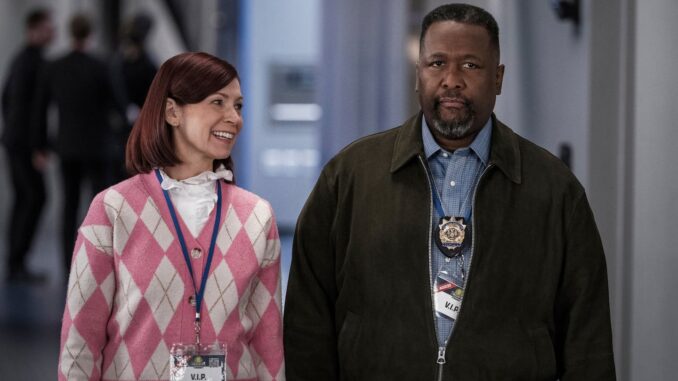
Is Elsbeth Worth Watching? Here’s What Critics & Fans Are Saying
In the ever-expanding universe of streaming options and network television, the perennial question for any discerning viewer remains: “Is it worth my time?” This query takes on particular resonance when a beloved character from an established franchise spins off into their own narrative. Such is the case with Elsbeth, the CBS procedural starring Carrie Preston as the eponymous, wonderfully idiosyncratic attorney Elsbeth Tascioni, transplanted from the high-stakes legal dramas of The Good Wife and The Good Fight into the world of New York City detective work. To answer whether Elsbeth is worth watching, one must navigate the often-divergent currents of critical analysis and fan adoration, finding the nuanced truth somewhere in between.
For the professional critic, the initial reaction to Elsbeth often begins with a nod of respect, a recognition of Carrie Preston’s undeniable talent. Critics, almost universally, tip their hats to Preston’s masterful portrayal of a character who is at once an airhead and a genius, a disarmingly cheerful presence with a mind sharper than a freshly honed scalpel. They commend her ability to imbue Elsbeth with both endearing quirks and profound depth, making her a singular force on screen. Publications like The Hollywood Reporter and Variety have lauded the show's pivot from the darker, more politically charged tones of its predecessors, appreciating Elsbeth's lighter, more whimsical approach to the procedural genre. They note the refreshing "howcatchem" format, where the killer is revealed early on, allowing the audience to focus on Elsbeth’s unique investigative process rather than a traditional whodunit. This lighter touch, many critics argue, is a welcome respite in a television landscape often saturated with grim realism.
However, the critical praise is often tempered with a pragmatic assessment of the show’s overall ambition and execution. Some critics find the procedural elements to be somewhat simplistic, lacking the intricate legal and moral quandaries that defined The Good Wife. They might point out that while Elsbeth’s genius is entertaining, the cases themselves can feel a tad formulaic, adhering closely to the established "Columbo" blueprint without significant innovation. There’s a sense that the show, in its deliberate effort to be charming and accessible, might sometimes sacrifice a deeper, more challenging narrative. The New York Times, while acknowledging Preston's brilliance, might raise an eyebrow at the lower stakes, suggesting that while delightful, Elsbeth doesn't quite reach the narrative heights or dramatic complexity of its acclaimed forebears. The recurring question from the critical perspective is whether Elsbeth’s singular charm can sustain an entire series without more substantial thematic underpinning.
Conversely, the fan base approaches Elsbeth with an entirely different set of expectations and, consequently, an almost unabashed adoration. For many, Elsbeth is less a procedural and more a warm hug, a delightful reunion with a character they’ve loved for years. Fans flock to the series not for intricate plot twists or profound social commentary, but for the sheer joy of watching Elsbeth be Elsbeth. Her disarming demeanor, her seemingly random observations that are actually laser-focused insights, her quirky fashion sense – these are the elements that resonate deeply with the show’s devoted audience. They find a comforting balm in the show’s predictable structure and its lighthearted tone, viewing it as perfect "comfort food" television.
On social media platforms and fan forums, the sentiment is overwhelmingly positive. Viewers express immense pleasure in seeing Elsbeth outside the confines of the courtroom, thriving in a new environment. They celebrate the show’s vibrant New York backdrop and the often-humorous interactions between Elsbeth and the more grounded detectives. For these fans, the show doesn't need to reinvent the wheel; it simply needs to deliver more of what they already love. Any perceived simplicity by critics is often lauded by fans as a welcome straightforwardness, a relief from the convolution of other dramas. They are less concerned with critical deconstruction and more focused on the pure entertainment value, the quirky escapism, and the sheer delight of spending an hour with a character who brings an undeniable smile to their faces.
Ultimately, whether Elsbeth is "worth watching" depends entirely on the lens through which one views it. If you are a viewer seeking groundbreaking television, complex narratives, or the intellectual rigor of its parent shows, critical opinion suggests you might find it charming but perhaps lacking in deeper substance. It’s a well-crafted, pleasant diversion, but not necessarily a prestige drama. However, if you are a fan seeking comfort, a dose of unique charm, a delightful lead performance, and a reliably entertaining "howcatchem" that feels like a warm embrace rather than a challenge, then Elsbeth is absolutely worth your time. Both critics and fans agree on the brilliance of Carrie Preston, a rare point of convergence. Beyond that, the show serves two distinct appetites: one for discerning analytical appreciation, and another for pure, unadulterated, quirky joy. So, grab a snack, settle in, and decide for yourself whether Elsbeth's singular genius is precisely what your viewing schedule needs.
